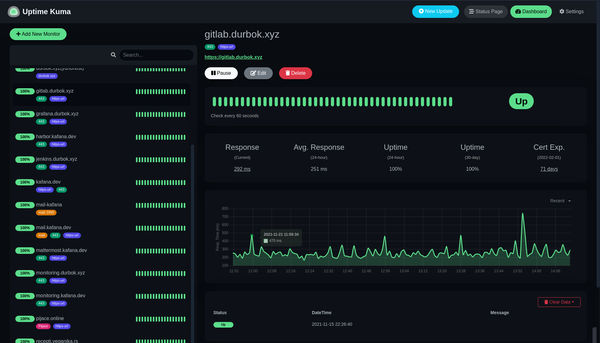How To Install Grav CMS Using Docker Swarm
You'll need a server, docker swarm, ssl and nginx installed.
Create a folder and cd into it.
Create a Dockerfile:
FROM php:7.4-fpm
ENV DEBIAN_FRONTEND noninteractive
# Get the basic stuff
RUN apt-get update && \
apt-get -y upgrade && \
apt-get install -y \
sudo net-tools procps nano \
libgmp-dev \
libfreetype6-dev \
libjpeg62-turbo-dev \
iputils-ping \
libxml2-dev \
unzip \
libonig-dev \
libzip-dev \
libsodium-dev \
libonig-dev
RUN docker-php-ext-install \
pdo \
pdo_mysql \
mysqli \
mbstring \
tokenizer \
xml \
ctype \
json \
zip \
intl \
bcmath \
sodium \
sockets \
gd \
exif
RUN apt-get update && \
apt-get install -y libfreetype6-dev libjpeg62-turbo-dev libpng-dev
RUN docker-php-ext-configure gd --with-freetype --with-jpeg && \
docker-php-ext-install gd
# Create user with sudo privileges
RUN useradd -ms /bin/bash -u 1000 durbok && \
usermod -aG sudo durbok
# New added for disable sudo password
RUN echo '%sudo ALL=(ALL) NOPASSWD:ALL' >> /etc/sudoers
# Set as default user
USER durbok
WORKDIR /var/www/html
ENV DEBIAN_FRONTEND teletype
CMD ["php-fpm"]Build docker image:
docker build -t your_docker_image_name:tag .Push docker image to your docker repo if you have it. You can use Docker hub or a private repo.
Create docker-compose.yml:
version: "3.7"
services:
prod:
image: ur_built_image_here:php:7.4-fpm
networks:
- durbok-net
deploy:
placement:
constraints:
- node.role == manager
replicas: 1
restart_policy:
condition: on-failure
volumes:
- ./grav-admin:/var/www/html
networks:
durbok-net:
external: trueCreate a folder for grav code (grav-admin in my case). Cd in to it, then download zip from https://getgrav.org/downloads and unzip it. You can remove *.zip afterwards.
Create a script (I've called it chmod.sh):
#!/bin/sh
chown -R $USER:www-data .
find . -type f -exec chmod 664 {} \;
find ./bin -type f -exec chmod 775 {} \;
find . -type d -exec chmod 775 {} \;
find . -type d -exec chmod +s {} \;Deploy grav:
docker stack deploy -c docker-compose.yml --with-registry-auth chose_nameEnter docker container and run chmod.sh.
docker exec -it container_name bash
sudo sh chmod.sh
exitIn case php-fpm didn't start you can run manually inside container:
php-fpm &
Nginx - I am also using docker for nginx which is also in a swarm mode.
Example:
version: '3.7'
services:
prod:
image: nginx:stable-alpine
volumes:
- ./nginx-conf:/etc/nginx/conf.d
- ./ssl:/etc/nginx/ssl
- ./webfolder:/var/www/html/webfolder
networks:
- durbok-net
deploy:
placement:
constraints:
- node.role == manager
replicas: 1
restart_policy:
condition: on-failure
ports:
- 80:80
- 443:443
networks:
durbok-net:
external: true
volumes:
nginx-conf:Nginx somename.conf:
server {
listen 80;
listen [::]:80;
server_name urdomain.dev;
rewrite ^ https://$http_host$request_uri? permanent;
}
server {
listen 443 ssl http2;
listen [::]:443 ssl http2;
server_name urdomain.dev;
root /var/www/html/webfolder/grav-admin;
try_files $uri $uri/ /index.php;
index index.html index.php;
client_max_body_size 256M;
error_log /var/log/nginx/grav_error.log;
access_log /var/log/nginx/grav_access.log;
location / {
try_files $uri $uri/ /index.php?$query_string;
}
location ~ \.php$ {
try_files $uri =404;
fastcgi_split_path_info ^(.+\.php)(/.+)$;
fastcgi_pass grav_prod:9000; # this is docker service name
fastcgi_index index.php;
include fastcgi_params;
## this is tricky part ### after scipt_filename I had to put /var/www/html cause that's where my code was in php-fpm docker container
fastcgi_param SCRIPT_FILENAME /var/www/html/$fastcgi_script_name;
fastcgi_param PATH_INFO $fastcgi_path_info;
}
location = /favicon.ico {
log_not_found off;
access_log off;
}
location = /robots.txt {
allow all;
log_not_found off;
access_log off;
}
location ~* \.(jpg|jpeg|png|gif|ico|css|js)$ {
expires 365d;
}
location ~* \.(pdf)$ {
expires 30d;
}
location ~* \.(jpg|jpeg|png|gif|ico|css|js)$ {
expires 90d;
add_header Cache-Control "public, no-transform";
}
location ~ /\.(?!well-known).* {
deny all;
access_log off;
log_not_found off;
}
add_header Content-Security-Policy upgrade-insecure-requests;
ssl_certificate /etc/nginx/ssl/ur.pem;
ssl_certificate_key /etc/nginx/ssl/ur.key;
# ssl_dhparam /etc/nginx/ssl/dhparams.pem;
ssl_session_timeout 5m;
ssl_session_cache shared:SSL:5m;
#SSL Security
ssl_protocols TLSv1 TLSv1.1 TLSv1.2;
ssl_ciphers 'EECDH+AESGCM:EDH+AESGCM:AES256+EECDH:AES256+EDH';
#XP and IE6 support
#ssl_ciphers 'ECDHE-ECDSA-AES256-GCM-SHA384:ECDHE-RSA-AES256-GCM-SHA384:ECDHE-ECDSA-CHACHA20-POLY1305:ECDHE-RSA-CHACHA20-POLY1305:ECDHE-ECDSA-AES128-GCM-SHA256:ECDHE-RSA-AES128-GCM-SHA256:ECDHE-ECDSA-AES256-SHA384:ECDHE-RSA-AES256-SHA384:ECDHE-ECDSA-AES128-SHA256:ECDHE-RSA-AES128-SHA256';
ssl_ecdh_curve secp384r1;
ssl_prefer_server_ciphers on;
ssl_session_tickets off;
proxy_set_header X-Forwarded-For $remote_addr;
#Compress and optimize delivery of files
gzip on;
gzip_comp_level 5;
gzip_min_length 256;
gzip_vary on;
gzip_types
application/atom+xml
application/javascript
application/json
application/ld+json
application/manifest+json
application/rss+xml
application/vnd.geo+json
application/vnd.ms-fontobject
application/x-font-ttf
application/x-web-app-manifest+json
application/xhtml+xml
application/xml
font/opentype
image/bmp
image/svg+xml
image/x-icon
text/cache-manifest
text/css
text/plain
text/vcard
text/vnd.rim.location.xloc
text/vtt
text/x-component
text/x-cross-domain-policy;
# text/html is always compressed by gzip module
}nginx -s reload



